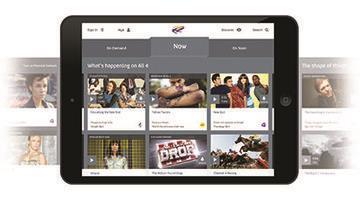When it comes to personalisation and improving the user experience, voice interfaces and artificial intelligence are going to have a big part to play, says Channel 4’s Orpheus Warr.
Chief Technology Officer Orpheus Warr oversees technology strategy and operations at the UK public service broadcaster (PSB) Channel 4.

As well as being responsible for architecture, R&D, information security, service delivery and distribution, he was instrumental in the design, launch and subsequent expansion of its on-demand service 4oD, now All 4.
Warr pinpoints the voice interface and artificial intelligence (AI) as being both hot and transformative. They will help to change how content is delivered and how consumers navigate and discover that content, he says. And the upshot of that will be a more personal TV service.
“Broadcasters and content providers are not just concerned with production but also how viewers discover and navigate that content.”
“In an increasingly crowded market, broadcasters and content providers are not just concerned with the content being produced but also how viewers discover and navigate that content and make sense of it,” explains Warr.
“There are lots of places to consume content and not all content is the same.
“Therefore, whatever we can do to help viewers feel like they are in control and help them to discover the right programming for them, is in our interest as well as theirs.”
Channel 4 has done a lot of work on its database of viewers, gathering additional information that can then be used to help shape and personalise their user experience.
But, while Warr acknowledges that guiding the viewer to appropriate Channel 4 programmes can benefit both broadcaster and viewer, he is keen to also embrace serendipity as part of the content journey. As such, rich metadata is key.
“There is a big data approach to personalisation to which you can then apply AI and machine learning that gives you insights that you would never otherwise be able to understand,” he says. “That can help ease the viewer’s journey through the content but also help to inspire and surprise them.
“AI and machine learning can be as important to terms of extracting metadata as they can be in structuring it and presenting it to the viewer,” he continues.
“As a PSB, from time-to-time we would like to introduce viewers to new things - not only helping them discover things by chance but sometimes guiding them. In the round, this should substantially improve the viewer experience because although viewers like to binge on particular genres, we also think there is probably untapped content - live, on-demand and archive - that people would really love and sometimes find it harder to discover than is optimal.”
But how does this dovetail with the voice interface? Asking Alexa to ‘dim the lights’ or ‘order more milk’ bears little resemblance to seeking out - or being recommended - a documentary you might like but didn’t know existed. Voice combined with a screen is the answer.
“Without a list of visual things to choose from, it can be difficult. You are simply trying to say something in the correct way. But if you are looking at a screen, and you are seeing content surfaced to you, and you are navigating through that interactively, the cues become much easier. The way in which you interact becomes much easier.”
Warr believes that where the industry is with the voice interface right now is similar to where we were with mobile phones 10 years ago.
“The iPhone changed the mobile phone experience,” he suggests. “In the same way, speaking to Alexa or the Google Assistant is very different from the way we have spoken to voice assistants on our phones or computers until now: the fidelity and information is greater, it is more reliable and the experience feels much more natural.”
Things will change further when the voice interface becomes a conversation interface.
“At the point where you are able to have an ordinary conversation, that will really increase user propensity to use and discover content more naturally,” he says.
Profile

Orpheus Warr
CTO, Channel 4 Television
Region: United Kingdom
As CTO, Orpheus Warr oversees both technology strategy and operations at Channel 4 with responsibility for architecture, R&D and information security as well as service delivery and distribution across IT, broadcast and non-linear platforms.
Warr was instrumental in the design and launch of the Channel’s pioneering 4oD product and has provided technical oversight of its expansion across an ever increasing number of devices and platforms, including its evolution into ‘All 4’.
Warr has driven the adoption of ‘Cloud’ technologies to power the company’s big data and online platforms, and continues to explore opportunities presented by the increasing convergence between linear and non-linear distribution.
























No comments yet